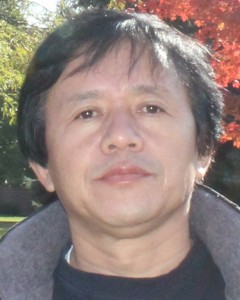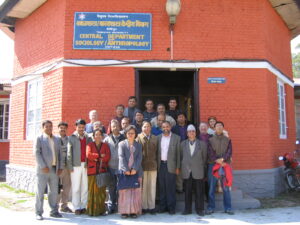Interview: Uddhav Rai of Tribhuvan University
 The Wenner-Gren Institutional Development Grant supports universities across the world as they develop their doctoral programs in anthropology and related sub-fields. Currently, there are five active grants, one of which is for the Department of Sociology and Anthropology at Tribhuvan University in Nepal. The department at Tribhuvan is working in close partnership with the Department of Anthropology at Cornell University. There have been faculty meetings in Nepal where Cornell Anthropologists have contributed towards developing and expanding the Curriculum at Tribhuvan. Another important component of the award is that faculty and students in Nepal have had the opportunity to spend a semester at Cornell. The Visiting Fellowship in fall 2011 went to Mr Uddhav Rai whose PhD dissertation topic is “Food Security and Exclusions among the Chepangs in Nepal.” On his return to Nepal, Wenner-Gren wanted to find out more of his impressions of his stay at Cornell.
The Wenner-Gren Institutional Development Grant supports universities across the world as they develop their doctoral programs in anthropology and related sub-fields. Currently, there are five active grants, one of which is for the Department of Sociology and Anthropology at Tribhuvan University in Nepal. The department at Tribhuvan is working in close partnership with the Department of Anthropology at Cornell University. There have been faculty meetings in Nepal where Cornell Anthropologists have contributed towards developing and expanding the Curriculum at Tribhuvan. Another important component of the award is that faculty and students in Nepal have had the opportunity to spend a semester at Cornell. The Visiting Fellowship in fall 2011 went to Mr Uddhav Rai whose PhD dissertation topic is “Food Security and Exclusions among the Chepangs in Nepal.” On his return to Nepal, Wenner-Gren wanted to find out more of his impressions of his stay at Cornell.
How did you get interested in Anthropology in Nepal and what led you to the graduate program?
When I got my bachelors degree from college, I came to pursue higher degree in the only university of Nepal and knew Anthropology was a new subject to study. I also learned that this subject was the study of indigenous people like me. Because of these two reasons – a new subject and study of my own culture attracted me to be an anthropologist.
Before you got to Cornell, what were your ideas about graduate school and universities in the U.S.?
Before coming to Cornell, I had the opportunity to participate in courses in the university in the UK and Netherlands, so I had some kind of same expectation that I imagined. When I enrolled in Cornell, it was more open space with huge academic resources and more independence for a graduate student. The multicultural environment and events each week in the campus added value to my learning.
What surprised you once you got to Cornell?
The academic resources and use of electronic resources are amazing. I never thought the personal charities could set up such great institutions like Cornell. Though I was a mature student, I never felt aloof. There were many students like myself whom I met who are now my friends.
How did you find anthropology in the United States?

There are no comparison between university in my country and universities in US in terms of academia and resources. The anthropologists are committed and working in the same area of interests during their lifetimes. This has added additional value as we can share the same avenue of the research. Unlike my country, I found huge resources invested in the anthropology by private and state institutions, and at the same time anthropologists are one of the major contributors to state making and governance.
Now you are back home for a while, when you think back on your stay in Cornell what stands out in your memory?
Honestly, I have become nostalgic to the academic environment of Cornell. I remember the level of academic discourse and seminars took place in my area of interests i.e. food security and exclusion. Also the level of cooperation and guidance of the professors. At the same time, now I am using my skills in the teaching and research at my home university. Also, I remain in contact with the professors at Cornell.
I know you went to the AAA meetings, what did you think of them?
AAA is huge academic fair. I had never imagined about 7-8 thousand same groups of academic people meeting in one place at the same time. Anyone could learn a lot of things from it including holding and managing conferences to sieving the juices out of it. I will use the management skills in our forthcoming two conferences namely – The silver jubilee and The International Conference of the Sociological Anthropological Society of Nepal (SASON). This was a great opportunity to me to attend the AAA meetings because I could update from the global level current issues in my areas of research. Similarly, I could network with the people who I have read and have been working on the same subject in different part of the world. It was a surprise to visit Wenner- Gren booth and interact with the people who supported me to come to the place. I truly appreciate it.